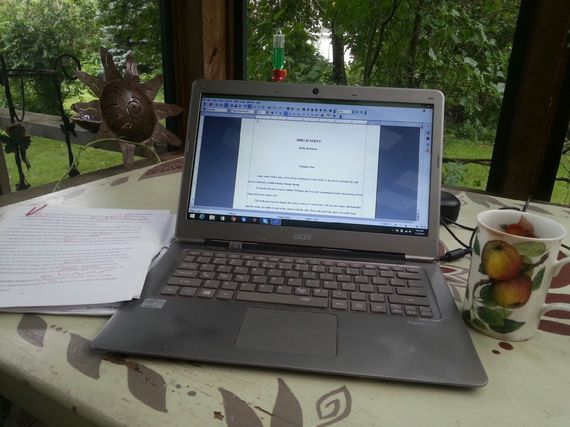For many writers, word count is everything. Me, not so much. At the start of every manuscript, I might write 2,000 words one day, only to decide that 1800 of those words should be trashed the very next morning.
This particular book I'm working on now -- a novel under contract with a publisher, with a deadline looming like a cliff casting chilly dark shadows -- has been more difficult to write than my previous books.
Why is this one so hard?
Maybe it's because the editor didn't like my first synopsis and made me write a different one, so I started out with a book idea that felt manufactured. Maybe it's because my youngest son left for college and I'm helping my mom move. Maybe it's my husband's new gluten-free diet.
Or maybe I only THINK this book is the most difficult one I've written because I'm about 200 pages into it.
I have to keep reminding myself that this happens to me every time. When I write a novel, I churn out about 200 pages and then encounter this huge brick wall with no way up it and no way around it. The plot is a tangle. The characters and their motivations are muddied. The descriptions are duller than dirt. The emotions elude me. The agent will hate it. The editor will hate it even more.
I hate myself! I'm going to just return that advance money to the publisher and quit this torture!
That's what I want to say, but I won't. I'm far too stubborn.
I have also learned to trust the process of writing. Here are four key strategies I use to get me through this crisis in confidence. I hope they'll help you, too -- and, if you have any strategies of your own to share, please do!
1. Start Your Book Somewhere New
For the last three books, whenever I've been brought to my knees by the process of pushing word boulders uphill, I start the book somewhere new -- generally around fifty pages deeper in, maybe Chapter 3 or Chapter 4. And then, like magic, things start to come together.
2. Ditch Characters Who Annoy You
If a character gives me too much trouble, or even if I don't particularly like her, I delete her from the book. Few things are as satisfying as using that "Edit" key and finding passages with that inessential character who is cluttering my pages and deleting them. I just did that with my current manuscript, eliminating a daughter who did nothing but whine to her parents. I thought I needed her, since I'd planned to have her play a big role in uncovering her father's deep secret. Then I realized that her younger sister, who was hiding a secret of her own, could do the job. Two birds with one stone! And I don't have to listen to that awful whining girl a minute longer!
3. Create a Flashback Dump
One reason my novels limp along when I first start writing them is because I've clogged the front half with too many flashbacks. This is an essential part of my writing process, because it lets me get to know my characters. I learn their histories, hear their voices and start to sprinkle fairy dust to bring them to life. Eventually, though, I get so frustrated moving pieces around that I have to create a "Flashback Dump," an actual file of flashbacks. I continue writing the draft without flashbacks, and then go fishing in the dump later to see if there is any useful back story that will add depth and nuances to scenes in an organic way.
4. Give Your Book Time to Grow
I once had a writing teacher tell me that every book should be allowed to be a child -- no rules, no manners. Play time! Later, once the book has grown to its full height (or page count), you can demand more of it and tell it to shape up. This may take six months or six years. It will definitely require some healthy dieting (cutting) and hygiene lessons (cleaning up messy grammar and off-the-shelf imagery). Oh, and you'll need your book to be more confident, too, about showing its narrative tension. Finally, your book will be a young adult, ready to go out into the world with shiny shoes and a new haircut, prepared to strut its best self.

